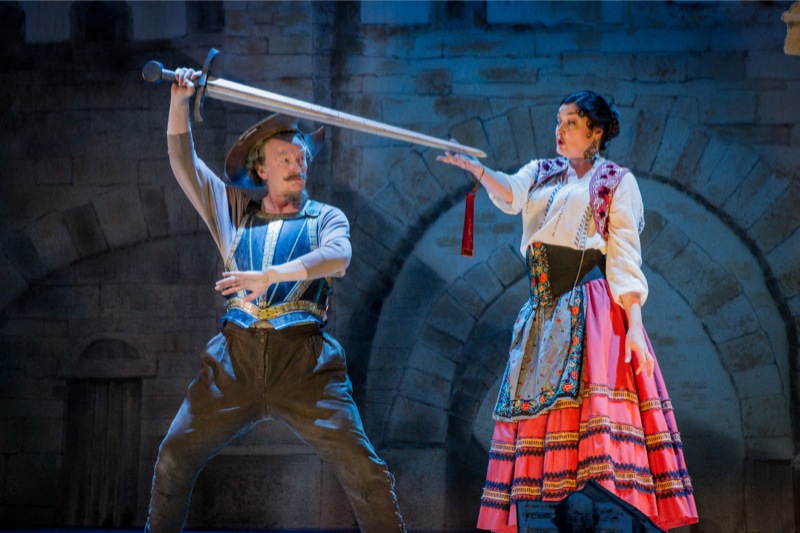Don Quichotte, Grange Park Opera, June 2014
Posted on 23 June 2014In the much-performed Don Quixote ballet (music by Minkus) the Don sees his fantasy Dulcinée as one of a pair of young lovers whom he gracefully helps bring together, and they are the main characters. But in this late Massenet opera the main character is the noble yet delusional Don himself, with Dulcinée as a vivacious young woman who revels in the joys of love.

Stage within a stage, all images GPO/ Robert Workman
It ends not with young love, but the death of the Don after his Act IV rejection by Dulcinée, at first laughingly and then, dismissing the guests, with great gentleness (Oui, je souffre votre tristesse). In this production after the guests return to poke fun at the old man, David Stout as Sancho Panza made a terrific entrance condemning them for their insolence, and his Riez, allez, riez du pauvre idéologue (Laugh, go on, laugh at the poor idealist) was heart rending. The musical interlude following this high point leads into the brief Act V where Sancho Panza cares for the Don’s last moments on this earth, and my abiding memory is of Clive Bayley as the sad but noble Don who, despite recovering Dulcinée’s necklace from the Hooray Henrys who purloined it, accedes to fate and makes his final journey … to the land of no return.

The Don and Dulcinée
Yet there is plenty of action before this point, and Bayley’s strong singing of what is one of the great bass roles in the repertoire was complemented by his fine stage presence evoking a tough and scrawny old bird. Stout and Bayley were gloriously lyrical together, and Bayley’s rendering of the Act II monologue Je suis le chevalier errant was beautifully sung. The production by Charles Edwards, who also did the designs, well lit by Paul Keogan, uses the clever device of a stage within a stage, and I loved the Act IV background for the inner stage showing a newspaper report about Mme Arbell, the first Dulcinée and close friend of Massenet who created roles in several of his operas.

The Don and Sancho Panza
As Dulcinée herself, Sara Fulgoni gave an assertive Carmen-like performance in her striking red dress, but without the tenderness that should emerge, particularly in the final dismissal of the Don. Fine support from the rest of the cast, and excellent musical direction by Renato Balsadonna, who as chorus director of the Royal Opera must surely know that John Lanchbery appropriated some of this music for Kenneth MacMillan’s ballet Manon, along with excerpts from other less well-known Massenet operas.
There are plenty of those, but if this composer’s music can be somewhat uneven, Don Quichotte contains glorious moments, and the performances of Clive Bayley and David Stout fully brought out the drama and emotion of a man whose delusions are finally broken. When the Don finally sees himself as nothing more than a character on a stage of his own invention — as represented by Charles Edwards’ stage within a stage — his life is over.
Performances continue on various dates until July 9 — for details click here.

